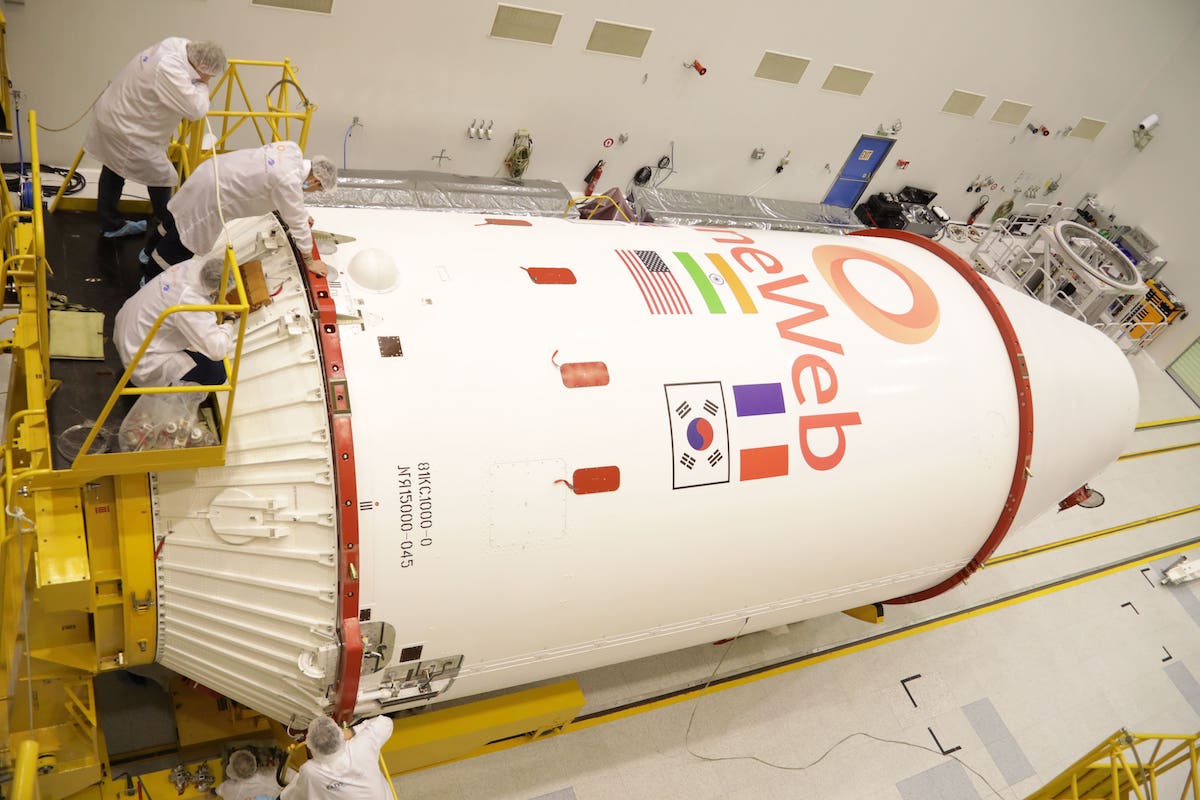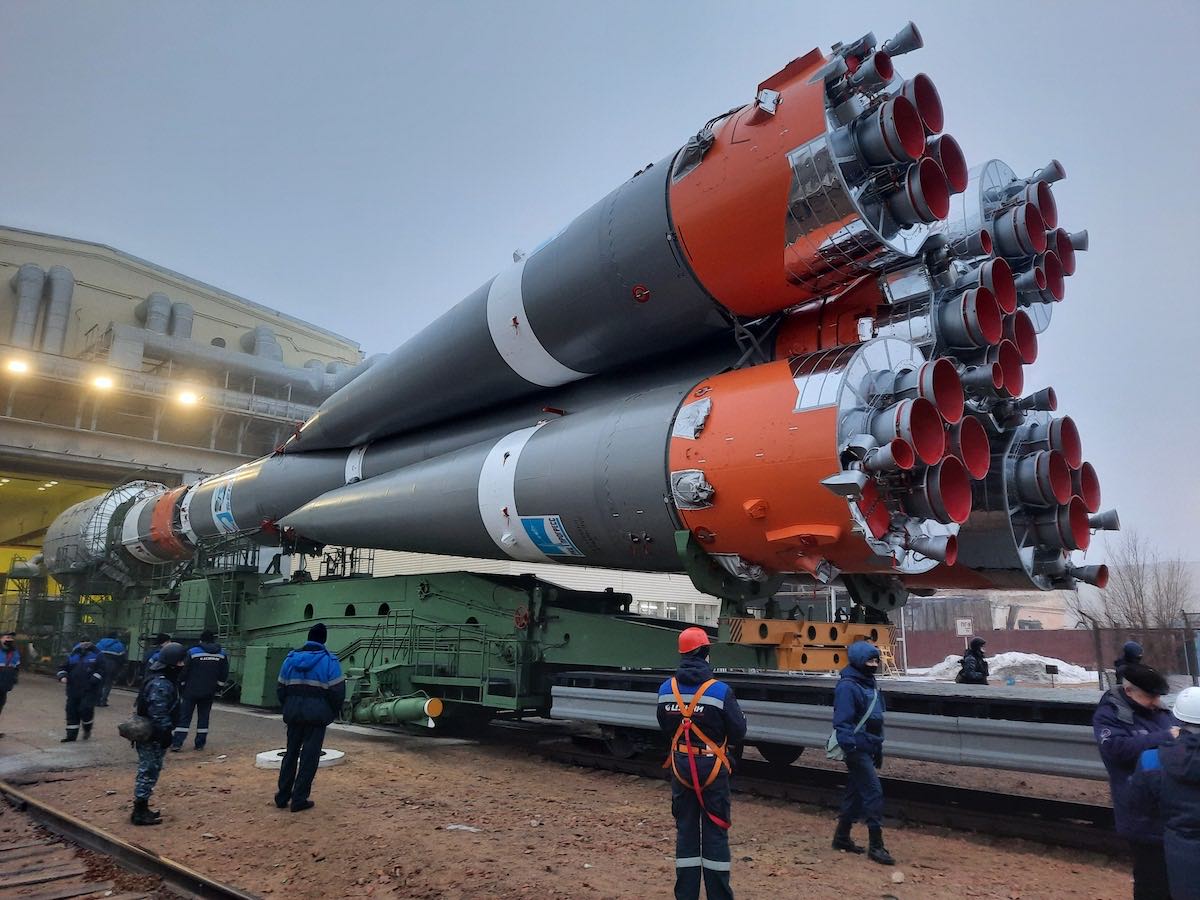
Russia’s space agency said Wednesday it will not launch a batch of 36 OneWeb satellites this week unless the UK government gives up its stake in the satellite internet company, a prospect the UK business secretary later confirmed won’t happen.
A Russian Soyuz rocket rolled to its launch pad Wednesday at the Baikonur Cosmodrome in Kazakhstan, moving into position for a launch Friday. But hours later, the head of Russia’s space agency issued an ultimatum to OneWeb and the UK government, one of the company’s largest shareholders.
Dmitry Rogozin, who has made numerous incendiary statements since Russia’s invasion of Ukraine, said it would not proceed with the launch Friday unless OneWeb guarantees its satellites won’t be used for military purposes and the UK government withdraws as a shareholder in the company.
“Because of Britain’s hostile stance against Russia, another condition for the (OneWeb) launch is that the British government withdraws from OneWeb,” the Russian space agency, Roscosmos, said in a statement.
The ultimatum drew a quick response from Kwasi Karteng, the UK business and energy secretary.
“There’s no negotiation on OneWeb: the UK government is not selling its share,” Karteng tweeted. “We are in touch with other shareholders to discuss next steps.”
“OK. I give you two days to think,” Rogozin responded. “(If) there will be no guarantees of non-military use of the system – there will be no system.”
Rogozin said the Soyuz rocket will be removed from the launch pad if Russia doesn’t get the assurances it wants from OneWeb by 9:30 p.m. Moscow time (1830 GMT; 1:30 p.m. EST) Friday, when managers need to decide whether to fuel the launch vehicle.
Chris McLaughlin, OneWeb’s chief of government, regulatory, and engagement, said the company’s employees are no longer onsite at Baikonur.
“We await a response from our shareholders,” he wrote in an email to Spaceflight Now, referring to the UK business secretary’s earlier statement that the British government won’t be selling its shares in OneWeb.
OneWeb has launched 428 of its planned 648 satellites on Soyuz rockets from spaceports in Kazakhstan, Russia, and French Guiana. The company is building out a network to provide high-speed, low-latency internet services worldwide.
The partially-complete network can provide broadband connectivity across high latitude regions — such as Alaska, Canada, and northern Europe — but doesn’t yet offer uninterrupted global reach. OneWeb says its network can connect schools, hospitals, and rural communities.
Last year, OneWeb announced agreements to provide connectivity to U.S. and European military users.
Peraton, a military contractor, said it will partner with OneWeb offer communications services to the U.S. Defense Department, with connectivity for military forces operating in remote, hard-to-reach regions. OneWeb also announced an agreement with Airbus in December to provide services to the UK military, along with other European defense and security forces.
“OneWeb’s network supports air, land, sea, and space communications for government networks and missions demanding rapid deployability; military-grade network security; flexibility, and the ability to scale,” the company says on its website.
Later Wednesday, Rogozin tweeted a video showing Russian crews at Baikonur installing 3M adhesive panels over the British, Japanese, and U.S. flags on the payload fairing of the Soyuz rocket. The video did not show the team covering Indian, French, and South Korean flags on the rocket.
The flags were added to the payload shroud to represent the home countries of the major partners in the OneWeb program.
Стартовики на Байконуре решили, что без флагов некоторых стран наша ракета будет краше выглядеть. pic.twitter.com/jG1ohimNuX
— РОГОЗИН (@Rogozin) March 2, 2022
The first OneWeb satellites launched in 2019, before the company filed for bankruptcy in 2020. OneWeb emerged from bankruptcy under new joint ownership of the Indian telecom company Bharti Global and the UK government.
Other major investors in OneWeb include the Japanese company SoftBank, the French satellite communications firm Eutelsat, U.S.-based Hughes, and the South Korean business conglomerate Hanwha.
OneWeb’s network is one of two large megaconstellations well advanced into deployment and initial operations. SpaceX’s Starlink internet fleet is the other one.
Arianespace won a contract in 2015 to launch OneWeb’s satellites on Russian Soyuz rockets. After several changes, the deal between Arianespace and OneWeb now covers 19 launches aboard Russian Soyuz rockets. The launch Friday was supposed to be the 14th of the 19 Soyuz missions on the contract.
The Soyuz rockets are procured by Arianespace through Glavkosmos, a subsidiary of Roscosmos, from Progress Rocket Space Center in Samara, Russia. Arianespace says it is responsible fro the overall mission and flight-worthiness of the Soyuz rockets.
In an interview on a Russian state-owned TV network, Rogozin said the contract for the next OneWeb launch has been “paid in full.”
“We received all money for the manufacture of booster rockets and for necessary launch services,” he said.
Without mentioning Russia’s invasion of Ukraine, Rogozin claimed “force majeure circumstances” arose, blaming the “aggressive policy of the West and the sanctions that are applied to Russia.”
Arianespace did not respond to questions from Spaceflight Now.
OneWeb’s satellites are built in a factory just outside the gates of NASA’s Kennedy Space Center in Florida by a joint venture between OneWeb and Airbus. They fly in polar orbit at an altitude of 745 miles (1,200 kilometers).
If OneWeb is unable to complete its remaining six launches on Soyuz, it’s not clear what launch providers might be able to serve as a stopgap solution.
SpaceX could launch OneWeb satellites from its facilities just a few miles away from the OneWeb factory. But SpaceX’s Starlink network is a competitor to OneWeb, possibly quelling any appetite for cooperation from either company.
United Launch Alliance has sold all of its remaining Atlas 5 rockets, and the company’s new Vulcan launcher is not yet ready to fly.
Arianespace holds the OneWeb launch contract, but it also has no near-term options to accommodate the OneWeb satellites. Europe’s Vega rocket is too small to carry a large number of OneWeb satellites on a single mission, and Europe’s Ariane 5 is fully booked until retirement. The new European rocket, the Ariane 6, is still in development.
OneWeb could launch satellites on Indian rockets, leaning on Bharti Global, the company’s leading Indian-based shareholder. But it’s not clear when an Indian launcher might be available, or what modifications might be needed to OneWeb satellites and their deployment mechanisms to fit on a different type of rocket.

Russia’s ultimatum to OneWeb and the UK government comes days after Rogozin announced Roscosmos will evacuate Russian specialists from French Guiana, home of Europe’s primary spaceport. The Russian teams were working there to prepare for a Soyuz rocket mission in early April with two European Galileo navigation satellites.
Rogozin said 29 of the 87 Russian employees have already left French Guiana. The Soyuz rocket for the April launch was previously delivered to the Guiana Space Center, but Russian technicians and engineers are required to prepare the vehicle for flight.
The disruption means the Galileo satellites will remain grounded, and raises doubts over the long-term future of Soyuz launch operations in French Guiana.
After the April launch, another Soyuz rocket was scheduled to take off from French Guiana later this year with two additional Galileo navigation satellites. Other missions booked to launch on Soyuz rockets from French Guiana include the French military’s CSO 3 optical spy satellite and the EarthCARE climate science mission for the European Space Agency.
ESA’s Euclid telescope, designed to study dark energy and dark matter, is also assigned to a Soyuz launch from French Guiana next year.
The Soyuz launch base in French Guiana entered service in 2011 under the auspices of a cooperative agreement between Roscosmos and the European Space Agency. Since then, 27 Soyuz rockets have launched from the Guiana Space Center, carrying Galileo navigation satellites, commercial communications and Earth observation payloads, space science missions, and French and Italian military satellites.
French Guiana is an overseas department of France, meaning the spaceport is built on the territory of a NATO country. The Soyuz launch pad in French Guiana is European-owned, and Arianespace oversees launch operations at the site.
Email the author.
Follow Stephen Clark on Twitter: @StephenClark1.
